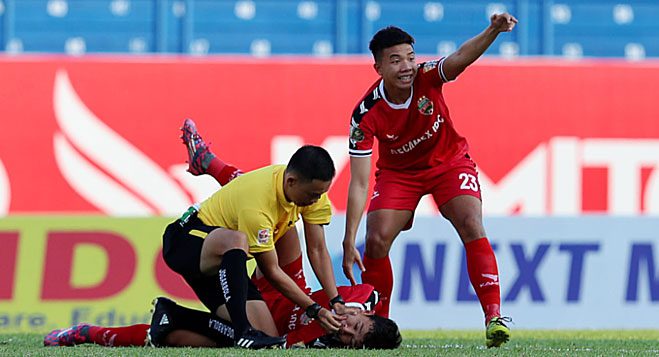When experiencing a strong impact, the tongue muscle can fall back, causing airway obstruction, hindering breathing, and potentially leading to death if not treated promptly.
According to Dr. Vu Tuong Lan from the Emergency Resuscitation Department at Bach Mai Hospital, under normal circumstances, humans cannot swallow their tongues. This is because there is a cross-shaped structure in the mouth known as the lingual frenulum. The frenulum connects the base of the tongue to the floor of the mouth, keeping the tongue fixed in place. Therefore, the tongue remains at the bottom of the mouth, and one can never swallow their own tongue.

Referee assisting a player after a collision in a match to prevent tongue swallowing. (Photo: Duc Dong).
When a person experiences a strong impact, the tongue muscle system does not operate normally, causing the tongue to fall back into the throat, leading to airway obstruction. This can even result in stomach contents entering the lungs, further obstructing breathing. The victim may suffer from oxygen deprivation, and without timely intervention, this could result in death. Medically, this is referred to as tongue retraction or tongue swallowing phenomena.
In such cases, the most fundamental principle of first aid is to immediately clear the victim’s airway by positioning them on their side, preventing the tongue muscle from falling back, especially in individuals who are unconscious.
You can use soft objects such as gauze or fabric to prop open the victim’s mouth, avoiding the use of spoons or coins that could injure the teeth or jaw.
Absolutely do not use your fingers to insert into the mouth of someone who is convulsing to try to stabilize the tongue. According to Dr. Lan, the human bite force ranges from 150 to 200 PSI (pounds per square inch), which is nearly equivalent to 105,000-140,000 kg (force)/m2. Therefore, using your hands to pry open the victim’s mouth while they are convulsing could result in being bitten or even having tendons in your fingers severed, posing a danger to both the patient and the rescuer.
During first aid, artificial respiration should not be performed as the patient may choke. Do not give food or drink to the victim, do not hold their mouth shut, and do not place anything in the mouth of the patient.
In situations involving strong impacts, it is also important to be aware of potential cervical spine injuries in the victim. If you lack expertise, improper handling could worsen the condition. The rescuer should protect and immobilize the victim’s cervical spine or use medical equipment to safeguard the patient’s life.



















































